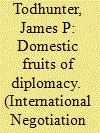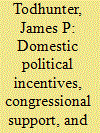| Srl | Item |
| 1 |
ID:
123171


|
|
|
|
|
| Publication |
2013.
|
| Summary/Abstract |
Abstract The notion that national leaders use foreign policy actions for domestic political benefit is widely accepted in the foreign policy literature, but has only been studied with regard to foreign policy involving the use of force. Literature on third-party mediation has emerged separately and has not taken mediators' domestic political motivations and constraints into account when explaining mediation occurrence and outcomes. Diplomatic efforts such as mediation should be appealing to leaders seeking to impress their domestic audience because it provides them with a low risk opportunity to appear competent to their domestic audience. While mediation is a regular occurrence in US foreign policy, its public visibility varies greatly. However, models of presidential media coverage suggest that media outlets are likely to pay a disproportionate amount of attention to presidents and their high level surrogates while engaging in diplomacy overseas. The article proposes that the higher the profile of the official an administration sends to mediate a crisis overseas, the greater the increase in the president's approval rating. Additionally, the public's attentiveness to foreign policy should condition the effect of a high profile mediator on presidential approval. As foreign policy becomes more salient to the public, the effect of a higher profile mediator on presidential approval should be greater. Empirical results support the argument.
|
|
|
|
|
|
|
|
|
|
|
|
|
|
|
|
| 2 |
ID:
160864


|
|
|
|
|
| Summary/Abstract |
Powerful states have numerous resources that can be mobilized in mediation processes. However, evidence suggests that such states are not more likely to be successful than other mediators. This article examines U.S. mediations through the lens of foreign policy decision making and argues that leaders make foreign policy decisions primarily with their domestic consequences in mind. Further, it contends that presidential administrations seek to build a record of success in order to improve their domestic political fortunes based on the policy options available to them. The study tests two explanations of foreign policy substitution based on domestic conditions and institutional configurations, the “party cover” and “policy availability” arguments, for U.S. mediations from 1945–1999. Results for the party cover argument are more robust, suggesting that domestic conditions play an important role in the decision to engage in mediation and imply that successful mediation is secondary to domestic politics.
|
|
|
|
|
|
|
|
|
|
|
|
|
|
|
|